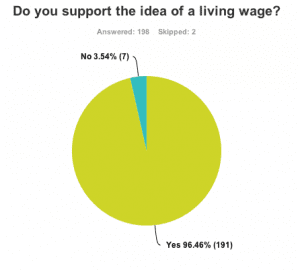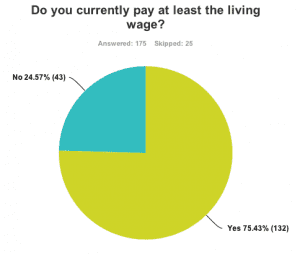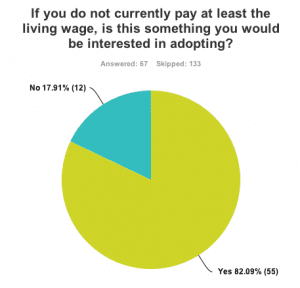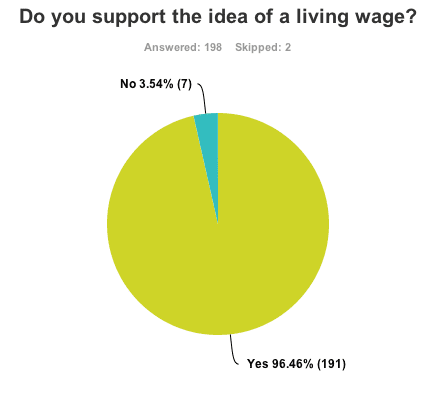 A poll carried out by Business for Scotland has found huge levels of support amongst SME business owners for paying the living wage. The survey generated 200 responses from employers within the Business for Scotland membership (nearly 4,000) and found overwhelming support for paying the living wage; 96% or 191 respondents.
A poll carried out by Business for Scotland has found huge levels of support amongst SME business owners for paying the living wage. The survey generated 200 responses from employers within the Business for Scotland membership (nearly 4,000) and found overwhelming support for paying the living wage; 96% or 191 respondents.
Many employers that support the living wage have not registered as Living Wage employers, with several asking in the survey comments section: “How do we become an accredited Living Wage employer?”
132 or 75% of the employers currently pay the Living Wage or higher. Many respondents supplied details suggesting they paid young people and apprentices in particular above the Living Wage, with more than one company setting their own minimum wage at 20% above the Living Wage. The most common reason given for paying the minimum wage was to motivate employees and show that the company values them, which is mutually beneficial as it increases motivation, loyalty and productivity.
The second most popular reason given was that it makes economic sense and if all companies were to do this it would actually grow the economy and cut welfare costs. For example, one respondent stated: “If you cannot afford to pay at least the Living Wage you are relying on the taxpayer to subsidise your employees through tax credits and you really are not running a sustainable business”. Cutting back taxes, business rates and perhaps giving direct grants for taking on and training new staff (paid a Living Wage) would be better ways of supporting business.”
The economics argument is backed up by research published last week by Citizens UK, which found that low wages were generating welfare claims meaning that the taxpayer has to top up wages to the tune of £11bn a year across the UK. The four largest supermarkets (Asda, Morrison’s, Sainsbury’s and Tesco) between them are costing just under £1bn a year in tax credits and additional benefits payments. This is a direct subsidy from the rest of society to some of the largest PLCs. It is worth noting that benefit fraud (which must be reduced) generates headlines for costing the UK £1bn, however, the fact that subsidising major PLCs who pay such low wages they have to be subsidised by the taxpayer to the tune of £11bn per year, generates almost no media criticism.
 A total of 34 companies stated that they did not currently pay at least the Living Wage to all employees, some citing that Local Government contracts bound them to lower wages and others that their margins are so low they cannot afford to pay the level of wages they would like to. For example, the owner of a care home commented: “I’ve just heard that the settlement is for Care Staff only to be paid £7 per hour. It’s not great but it’s better than previous years and hopefully a move to a Living Wage. I believe the Living Wage would attract /retain better staff and provide better outcomes for residents.”
A total of 34 companies stated that they did not currently pay at least the Living Wage to all employees, some citing that Local Government contracts bound them to lower wages and others that their margins are so low they cannot afford to pay the level of wages they would like to. For example, the owner of a care home commented: “I’ve just heard that the settlement is for Care Staff only to be paid £7 per hour. It’s not great but it’s better than previous years and hopefully a move to a Living Wage. I believe the Living Wage would attract /retain better staff and provide better outcomes for residents.”
 A total of 55 of the 77 respondents that do not currently pay the living wage stated they would be interested in doing so. One employer commented that his business had 150 employees and the survey made him look into the wages of trainees; having found that they were not paid the Living Wage he arranged for this to be corrected. This combined with the larger number of companies who pay the Living Wage but have not sought accreditation has led Business for Scotland to set a target of 100 of our members becoming accredited Living Wage employers in 2015. We challenge other major business networks to generate a similar percentage of their networks to make this commitment. This will mean that the Scottish Government’s 500 target will be significantly surpassed.
A total of 55 of the 77 respondents that do not currently pay the living wage stated they would be interested in doing so. One employer commented that his business had 150 employees and the survey made him look into the wages of trainees; having found that they were not paid the Living Wage he arranged for this to be corrected. This combined with the larger number of companies who pay the Living Wage but have not sought accreditation has led Business for Scotland to set a target of 100 of our members becoming accredited Living Wage employers in 2015. We challenge other major business networks to generate a similar percentage of their networks to make this commitment. This will mean that the Scottish Government’s 500 target will be significantly surpassed.
Gillian O’Neil, of 29 Studios, said: “At 29studios and 29steps we pay even our youngest trainees well above the Living Wage and the commitment we show to our team is matched by the amazing commitment we receive from them.
“When you treat your employees with respect, in both the remuneration and the working environment you provide, you create a happy workforce who feel valued, and thus the business benefits are huge.
“I would urge other business owners to stop and think; try renting a house or paying a mortgage on the minimum wage. Try covering your childcare costs and your living costs on the minimum wage. Try loving your job when you don’t feel valued. It’s impossible, so why expect your employees to do it?”
Conclusion
The national Living Wage (£7.85 per hour versus £6.50 minimum wage) can be a key tool in addressing inequality. There is a growing weight of evidence that low wages are not just a drag on the economy but also a drag on the growth of businesses that pay low wages. Barclays committed to paying its cleaning staff 10 per cent over the London Living Wage and retention rates dramatically increased (for catering staff this is now 77 per cent compared to an industry norm of 54 per cent, and cleaning staff retention rates are 92 per cent compared to the industry norm of 35 per cent), meaning that the company spends substantially less on recruitment and training.
Employers need to do the maths – it is worth £1.35 an hour per employee to reduce absenteeism, raise staff retention rates, improve productivity, staff motivation and morale, increase loyalty, attract better staff and save on training costs. All that whilst lessening the money worries of your staff, contributing to the economy and significantly reducing the welfare bill that supports the hardworking poor.
Let’s bring the Living Wage in through a staged approach with incentives such as raising the threshold in employers’ National Insurance contributions. Yes, prices may increase, but we are experiencing a prolonged period of almost negative inflation so if not now, then when?
Business for Scotland – Prosperity for Scotland – Join us now









John Major used to refer to the “bastards” (his word not mine) in his back benches that made his time as prime minister very difficult. Cameron has far more “bastards” in his ranks than Major did, as Paddy Ashdown explains in this video from April.
https://youtu.be/AR-aBAIyaFI